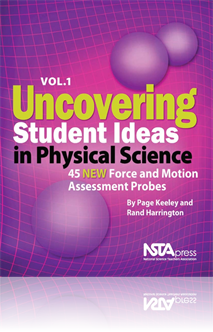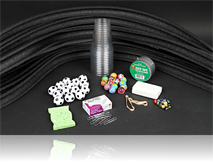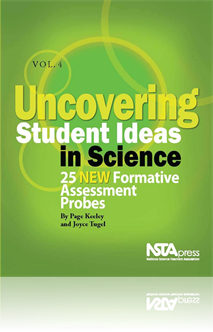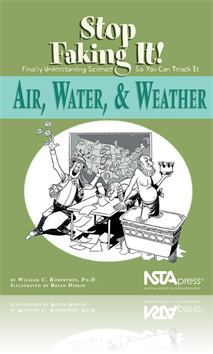All Physics resources
Journal Article
Incorporating Models Into Science Teaching to Meet the Next Generation Science Standards
Discover what the NGSS has to say about the proper use of models in the middle school classroom....
NSTA Press Book
Uncovering Student Ideas in Physical Science, Volume 1: 45 New Force and Motion Assessment Probes
Nationally known science educator Page Keeley—principal author of the hugely popular, four-volume NSTA Press series Uncovering Students Ideas in Science—has teamed up with physicist and science educator Rand Harrington to write this first volume ...
By Page Keeley, Rand Harrington
Book Chapter
The purpose of this assessment probe is to comprehensively elicit students' ideas about the relationship between force and motion. The list of possible answers includes several distracters that are based on learning research; thus the probe will tell...
Book Chapter
The purpose of this assessment probe is to elicit students' ideas about comparing motions. The probe is designed to see if students differentiate between the concept of position and the concept of speed. The probe will also help to see if students un...
Class Pack
*LAST CHANCE! This product is not eligible for return or exchange. All sales are final.* Using More Picture-Perfect Science Lessons: Using Children’s Books to Guide Inquiry, K-4 in your classroom is easier than ever! NSTA’s ClassPacks, each...
Book Chapter
The purpose of this assessment probe is to elicit students' ideas about magnetism. The probe is specifically designed to determine whether students believe air is necessary for magnets to work....
Book Chapter
Balloons and Other Things That Sometimes Float
Hot air balloons float--sometimes. Regular old balloons that you get at a party float--sometimes. Boats float--sometimes. What makes them float and what makes them sink? How can a boat made of steel float but a solid chunk of steel sink to the bottom...
NSTA Press Book
Sound: Stop Faking It! Finally Understanding Science So You Can Teach It
Muddled about what makes music? Stuck on the study of harmonics? Dumbfounded by how sound gets around? Now you no longer have to struggle to teach concepts you really don’t grasp yourself. Sound takes an intentionally light touch to help out all...
By William C. Robertson, Ph.D.
NSTA Press Book
Light: Stop Faking It! Finally Understanding Science So You Can Teach It
Why is left right and right left in the mirror? Baffled by the basics of reflection and refraction? Wondering just how the eye works? If you have trouble teaching concepts about light that you don’t fully grasp yourself, get help from a book that�...
By William C. Robertson, Ph.D.








